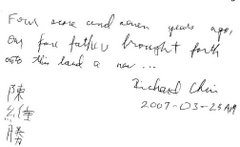Richard and I just returned home from Professor Christopher Scott's stem cell class at Stanford University. It was an honor to be asked to speak to his class about our experience in China. We learned a lot about the subject of stem cells by taking his course last summer.
We recently came across an article about China stem cell treatment co-written by AP reporter Alan Zagier. Mr. Zagier contacted Richard last May to ask him about our trip to China. What is even more interesting is a commentary on Mr. Zagier's article posted on this blog. I was both surprised and delighted to learn that the author of this insightful piece was a 10th grade student. The blog is the product of a school project and the posts written by "the brilliant minds of Jesse's 10th grade World History class."
Wednesday, March 5, 2008
Thursday, February 28, 2008
News from Bergamo
We recently received an email from Fabio about his blog on ALS. We met Fabio and his mother, Nadia, at Nanshan Hospital last year. Nadia has ALS and underwent stem cell treatment at the same time as Richard. Despite the language difficulty, it was easy to quickly warm up to this nice family. We think of them often.
Wednesday, February 27, 2008
ABC Nightline 2/15/08
Our friend George sent us this link to a recent ABC Nightline story on stem cell treatment in China. Here's the video link to the same story.
Monday, January 21, 2008
Update on PhosChol
Richard has taken the PhosChol supplement for a month now and unfortunately has not noticed any substantial improvement. He'll finish the bottle but will probably not order any more. The consensus among the folks on the MJD board who volunteered to be the PhosChol guinea pigs is that the supplement has not brought about a measurable change.
Monday, December 24, 2007
Viva Las Vegas
Merry Christmas everyone! We were in Las Vegas last week shopping for holiday gifts, taking in a show and doing some ground work for the Annual Membership Meeting of the National Ataxia Foundation. The event will be held at the Flamingo Hotel in Las Vegas from March 28th to March 30th, 2008. We wanted to see how accessible Las Vegas is, and in particular, we were interested in the facilities and configuration of the ADA hotel rooms.
In general, Las Vegas is probably one of the most accessible cities that we've ever visited. We've never seen more folks on wheelchairs and scooters, and they all seem to be having a great time. At the airport and cab stands, it seemed like every 4th or 5th taxi has the handicap accessible sign on the side of the cab. All big hotels have a fleet of scooters by the bell desk ready. Renting the scooter merely requires signing it out with the bellman. All of the public restrooms that we've used are handicap accessible as were the bathrooms and showers in most hotel spas. The elevated walkways at major intersections on the strip have elevators large enough for both wheelchairs and scooters. The monorail and trams are also accessible with space to accommodate even scooters. We were very impressed.
OK, enough PR for Vegas. Here's what we don't like about Vegas:
1. Can the casinos switch to a low pile carpet in the public areas? It was very tiring to get around the carpeted areas in a manual wheelchair. We (Andrea and I) pushed Richard around, and it tires us out after a while. Can you imagine Richard pushing himself around? Even though we don't gamble, in order to get to the room elevators, you have to snake your way around the entire casino floor. The layout of the casino can be very unfriendly for folks in wheelchairs because the hotel deliberately put slot machines in odd angles so that you have to squeeze around chairs to get from point A to point B.
2. Cigarette (second hand) smoke and an apparent dearth of ashtrays. Need I say more?
3. Why do hotels place their handicap accessible rooms in the most undesirable areas of the building? OK, I understand that the room must be close to the elevator, but does it have to face the freeway, the noisy delivery dock or the electric transformer that emits a bone-vibrating hum 24/7? I dare you to find a handicap hotel room in Vegas that has a view of the Strip! I was told that the only rooms of this kind exist at the Wynn Hotel. If only it didn't cost an arm and a leg ......
For those who are interested in attending the NAF Annual Meeting, you'll be please to know that the Flamingo has ADA rooms available at the rate of $124 per room per night. These go quickly, so be sure to make your reservation soon.
In general, Las Vegas is probably one of the most accessible cities that we've ever visited. We've never seen more folks on wheelchairs and scooters, and they all seem to be having a great time. At the airport and cab stands, it seemed like every 4th or 5th taxi has the handicap accessible sign on the side of the cab. All big hotels have a fleet of scooters by the bell desk ready. Renting the scooter merely requires signing it out with the bellman. All of the public restrooms that we've used are handicap accessible as were the bathrooms and showers in most hotel spas. The elevated walkways at major intersections on the strip have elevators large enough for both wheelchairs and scooters. The monorail and trams are also accessible with space to accommodate even scooters. We were very impressed.
OK, enough PR for Vegas. Here's what we don't like about Vegas:
1. Can the casinos switch to a low pile carpet in the public areas? It was very tiring to get around the carpeted areas in a manual wheelchair. We (Andrea and I) pushed Richard around, and it tires us out after a while. Can you imagine Richard pushing himself around? Even though we don't gamble, in order to get to the room elevators, you have to snake your way around the entire casino floor. The layout of the casino can be very unfriendly for folks in wheelchairs because the hotel deliberately put slot machines in odd angles so that you have to squeeze around chairs to get from point A to point B.
2. Cigarette (second hand) smoke and an apparent dearth of ashtrays. Need I say more?
3. Why do hotels place their handicap accessible rooms in the most undesirable areas of the building? OK, I understand that the room must be close to the elevator, but does it have to face the freeway, the noisy delivery dock or the electric transformer that emits a bone-vibrating hum 24/7? I dare you to find a handicap hotel room in Vegas that has a view of the Strip! I was told that the only rooms of this kind exist at the Wynn Hotel. If only it didn't cost an arm and a leg ......
For those who are interested in attending the NAF Annual Meeting, you'll be please to know that the Flamingo has ADA rooms available at the rate of $124 per room per night. These go quickly, so be sure to make your reservation soon.
Monday, December 3, 2007
Role Model
Stem cells, experimental drugs and other curative treatments aside, here's the inspirational story of Charlie Wedemeyer and his fight against ALS.
Saturday, December 1, 2007
Life isn't measured by the number of breaths you take
One of the biggest obstacles in raising funds and awareness for Ataxia is the fact that the number of people afflicted with the disease is minuscule compared with say, cancer or diabetes. Similarly, drug makers would rather direct their attention to researching cures for cardiovascular diseases than orphan ailments like SCA3. I recently came across an article in the Wall Street Journal that talked about one man's attempt in turning the tide on funding and finding the cure for ALS.
Speaking about spreading awareness of rare diseases, on an episode of House on TV a few weeks ago, a doctor confessed that she might have inherited Huntington's Disease from her mother. She refused to be genetically tested because "not knowing her fate encourages her to live life fuller." Although I do not agree with this character's reasoning, I do applaud her for wanting to live her life to the fullest despite her potential handicap.
On the home front, Richard is keeping up with exercising, eating right and taking various medicines and nutritional supplements prescribed and recommended to him. Lately, he has found a local physical therapist who has experience working with patients who has neurological ailments. In fact, the PT's father has MS so he is intimately familiar with this class of disease. Richard described his weekly 40-minute PT sessions as "brutally intense". Perhaps PT in this case means "physical terrorist"!
Through the MJD discussion group came news of a new nutritional supplement regime that has shown promise in improving ataxia symptoms. A few members on the MJD discussion group, including Richard, have volunteered to be the guinea pigs who will then keep tabs of their experiences and results of the supplement and report back to the group. Richard's initial efforts were hampered by the fact that we ordered the wrong type of Vitamin B. This has been corrected and he will start taking the correct Vitamin B and PhosChol starting next week. Also, we learned that in order to get the optimal results, the supplements cannot be taken in conjunction with any anti-depressants or any drug that affects the CNS (Central Nervous System). Wish us luck!
Speaking about spreading awareness of rare diseases, on an episode of House on TV a few weeks ago, a doctor confessed that she might have inherited Huntington's Disease from her mother. She refused to be genetically tested because "not knowing her fate encourages her to live life fuller." Although I do not agree with this character's reasoning, I do applaud her for wanting to live her life to the fullest despite her potential handicap.
On the home front, Richard is keeping up with exercising, eating right and taking various medicines and nutritional supplements prescribed and recommended to him. Lately, he has found a local physical therapist who has experience working with patients who has neurological ailments. In fact, the PT's father has MS so he is intimately familiar with this class of disease. Richard described his weekly 40-minute PT sessions as "brutally intense". Perhaps PT in this case means "physical terrorist"!
Through the MJD discussion group came news of a new nutritional supplement regime that has shown promise in improving ataxia symptoms. A few members on the MJD discussion group, including Richard, have volunteered to be the guinea pigs who will then keep tabs of their experiences and results of the supplement and report back to the group. Richard's initial efforts were hampered by the fact that we ordered the wrong type of Vitamin B. This has been corrected and he will start taking the correct Vitamin B and PhosChol starting next week. Also, we learned that in order to get the optimal results, the supplements cannot be taken in conjunction with any anti-depressants or any drug that affects the CNS (Central Nervous System). Wish us luck!
Subscribe to:
Posts (Atom)


